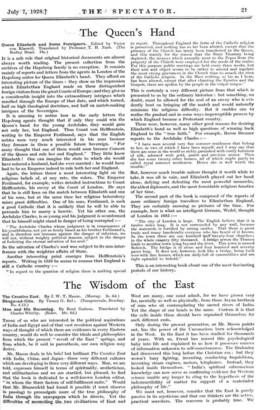The Queen's Hand IT is a safe rule that original
historical documents are Almost
always worth reading. The present collection from the archives of the Hapsburg family is no exception. It consists mainly of reports and letters from the agents in London of the Hapsburg suitor for Queen Elizabeth's hand. They afford an interesting picture of the times : they show us the impression which Elizabethan England made on these distinguished foreign visitors from the great Courts of Europe ; and they give us a considerable insight into the extraordinary intrigues which ramified through the Europe of that date, and which turned, half on high theological doctrines, and half on match-making intrigues of the Sovereigns.
It is amusing to notice how in the early letters the Hapsburg agents thought that if only they could win the Queen's hand for the young Archduke, they would gain not only her, but England. Thus Count von Helffenstein, writing to the Emperor Ferdinand, says that the English nobles were very much interested in his sons because they foresaw in them a possible future Sovereign. " For many thought that one of them would soon become Consort of the Queen and rule her and England." They little knew Elizabeth ! One can imagine the state to which she would have reduced a husband, had she ever married : he would have had to be an Emperor indeed to rule both her and England.
Again, the letters throw a most interesting light on the religious beliefs of, at any rate, the rulers. The Emperor Ferdinand, for example, writes detailed instructions to Count Helffenstein, his envoy at the Court of London. He says that he is still keen on the match between Elizabeth and one of his sons, but at the same time her religious heterodoxy raises great difficulties. One of his sons, Ferdinand, is such a good Catholic that it is unlikely that he will be able to persuade him to marry a heretic. Yet his other son, the Archduke Charles, is so young and his judgment is so unformed that he himself might stand in danger of being corrupted :—
" The Archduke Charles whose- judgment is in consequence of his youthfulness, not yet so firmly based as his brother Ferdinand's, and is therefore not immune against the danger of infection, we will not, without weighty political reasons, subject to the danger of forfeiting the eternal salvation of his soul."
So the salvation of- Charles's soul was subject to- its non-inter- ference with the weightier affairs of State.
Another interesting point emerges from Helffenstein's reports. Writing in 1559 he seems to assume that England is still a Catholic country :-
" In regard to the question of religion there is nothing special
to report. Throughout England the form of the Catholic religion is preserved, and nothing has so far been altered, except that the primacy of the Church has lately been transferred to the Queen. and this mainly for the reason that the State Treasury being depleted, the moneys which annually went to the Popes from the property of the Church were employed for the needs of the realm: For this purpose public meetings are held every three weeks, but their aim and object seems to be rather to amend and regulate the most crying grievances in the Church than to attack the rites of the Catholic religion. In the Mass nothing, so far as I hear, has been altered, except that after chanting the Epistles and the Gospels, these are spoken by the people in the vulgar tongue."
This is certainly a very different picture from that which is presented to us by the ordinary historian : but something, no doubt, must be allowed for the zeal of an envoy who is evi- dently bent on bringing off the match and would naturally minimize the religious difficulty. But it enables one to realize the gradual and in some ways imperceptible process by which England became a Protestant country.
There were, however, many other good reasons for desiring Elizabeth's hand as well as high questions of winning back England to the " true faith." For example, Baron Brenner reports to the Archduke Charles :-
" I have seen several very fine summer residences that belong to her, in two of which I have been myself, and I may say that there are none in the world so richly garnished with costly furniture of silk, adorned with gold, pearls and precious stones. Then she has some twenty other houses, all of which might justly be called royal summer residences. Hence she is well worth the trouble."
But, however much trouble suitors thought it worth while to take, it was all in vain, and Elizabeth played out her hand alone, defying and defeating the most powerful monarchs; the ablest diplomats, and the most formidable religious fanatics of her time.
The second part of the book is composed of the reports of more ordinary foreign travellers to Elizabethan England. They are certainly amusing as pictures of the time. For example, here is what an intelligent German, Wedel, thought of London in 1685 :—
" The city of London is large. The English believe that it is twelve miles long. It is not surrounded by any wall, because the waterside is fortified by strong castles. That there is great trade and many handicrafts everyone who has heard of it knows. In the town there are one hrindred'aridAltiventy-four churches ; in the whole cOkintry fifty thousand. A bridge across the Thames leads. ta another, town lying. beyond tird river. This town is named Sedorck. The bridge is of stone and four hundred and seventy paces king. It does not, however, look like a bridge, being built over with fine houses, which are daily full of commodities and are right splendid to behold."
This is an interesting book about one of the most fascinating periods of our history.












































 Previous page
Previous page